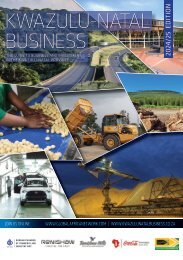South African Business 2018 edition
Welcome to the sixth edition of the South African Business journal. First published in 2011, the publication has established itself as the premier business and investment guide to South Africa, supported by an e-book edition at www.southafricanbusiness.co.za. Regular pages cover all the main economic sectors of the South African economy and give a snapshot of each of the country’s provincial economies. Feature articles on topical issues such as sustainability and African trade provide unique insights, together with an interview with the newly elected chairman of the African Association of Automotive Manufacturers, Mr Thomas Schaefer. Another special feature focusses on an exciting project to transform South Africa’s small harbours and coastal properties. South African Business is complemented by nine regional publications covering the business and investment environment in each of South Africa’s provinces. The e-book editions can be viewed online at www.globalafricanetwork.com. First published in 2011, the publication has established itself as the premier business and investment guide to South Africa, supported by an e-book edition at www.southafricanbusiness.co.za Regular pages cover all the main economic sectors of the South African economy and give a snapshot of each of the country’s provincial economies. Feature articles on topical issues such as sustainability and African trade provide unique insights, together with an interview with the newly elected chairman of the African Association of Automotive Manufacturers, Mr Thomas Schaefer. Another special feature focusses on an exciting project to transform South Africa’s small harbours and coastal properties. South African Business is complemented by nine regional publications covering the business and investment environment in each of South Africa’s provinces. Visit www.globalafricanetwork.com for more business and investment news, opportunities and events.
Welcome to the sixth edition of the South African Business journal. First published in 2011, the publication has established itself as the premier business and investment guide to South Africa, supported by an e-book edition at www.southafricanbusiness.co.za.
Regular pages cover all the main economic sectors of the South African economy and give a snapshot of each of the country’s provincial economies. Feature articles on topical issues such as sustainability and African trade provide unique insights, together with an interview with the newly elected chairman of the African Association of Automotive Manufacturers, Mr Thomas Schaefer. Another special feature focusses on an exciting project to transform South Africa’s small harbours and coastal properties.
South African Business is complemented by nine regional publications covering the business and investment environment in each of South Africa’s provinces. The e-book editions can be viewed online at www.globalafricanetwork.com.
First published in 2011, the publication has established itself as the premier business and investment guide to South Africa, supported by an e-book edition at www.southafricanbusiness.co.za
Regular pages cover all the main economic sectors of the South African economy and give a snapshot of each of the country’s provincial economies. Feature articles on topical issues such as sustainability and African trade provide unique insights, together with an interview with the newly elected chairman of the African Association of Automotive Manufacturers, Mr Thomas Schaefer. Another special feature focusses on an exciting project to transform South Africa’s small harbours and coastal properties.
South African Business is complemented by nine regional publications covering the business and investment environment in each of South Africa’s provinces. Visit www.globalafricanetwork.com for more business and investment news, opportunities and events.
You also want an ePaper? Increase the reach of your titles
YUMPU automatically turns print PDFs into web optimized ePapers that Google loves.
Key sectors<br />
The leading economic sectors, as defined by<br />
the Gauteng Growth and Development Agency<br />
(GGDA), are finance (21% of provincial GDP), manufacturing<br />
(19.7%), government services (15.7%) and<br />
trade (12.8%).<br />
Most of the major banks are positioned around<br />
Johannesburg (which is home to Africa’s largest stock<br />
exchange, the JSE), and the finance and business<br />
services sector is a key focus in the provincial economy.<br />
Many international corporates such as Citibank,<br />
Microsoft and McDonald’s are headquartered in the<br />
province, as it is seen as the commerce capital and<br />
the gateway to Africa.<br />
Gauteng has a varied manufacturing sector, from<br />
heavy-steel, automotive assembly to the food and<br />
beverages industry as well as light commercial and<br />
industrial activity. Key food and beverage brands have<br />
manufacturing plants in Gauteng. Nestlé and Pioneer<br />
Foods have spent millions on new developments<br />
and improvements. RCL, one the country’s leaders<br />
in poultry production, has 18 farms and two feed<br />
mills in the province.<br />
Companies such as Kimberly-Clark, Proctor &<br />
Gamble, ArcelorMittal, Transnet Engineering and<br />
Aspen all have facilities in Gauteng Province. The<br />
manufacturing sector in Gauteng employs 600 000<br />
people in more than 9 000 enterprises.<br />
Gauteng’s contribution to the country’s gold and<br />
diamond production is still significant, and the province’s<br />
mines account for about 21% of employment<br />
in the sector nationally. The other primary sector,<br />
agriculture, contributes little to the provincial GDP but<br />
there are important districts such as Delmas, Cullinan,<br />
Krugersdorp, Bronkhorstspruit and Heidelberg where<br />
a variety of crops are cultivated. Large maize- and<br />
grain-farming enterprises are found in the western<br />
and southern parts of the province. Other products<br />
produced in large volumes are vegetables, fruit, dairy,<br />
poultry and eggs.<br />
Economic future<br />
The idea of the “City Region” is increasingly driving<br />
economic planning and investment priorities,<br />
REGION<br />
both public and private. Linked to this is the need to<br />
continually invest in infrastructure.<br />
Gauteng is a national leader in attracting foreign<br />
direct investment (FDI). In the period 2014-16, the<br />
province attracted R66-billion. The Gauteng Growth<br />
and Development Agency has a specialised subsidiary,<br />
the Gauteng Investment Centre, which acts as a<br />
“one-stop shop” for potential investors looking for<br />
advice and support.<br />
In 2016, the Gauteng City Region Economic<br />
Indaba was attended by all the mayors of the region,<br />
the national Minister of Finance and was addressed<br />
the <strong>South</strong> <strong>African</strong> Deputy President. Gauteng<br />
Premier David Makhura gave notice of “how we can<br />
unlock, jump-start and reignite a sustainable and<br />
inclusive growth trajectory for key sectors of our<br />
provincial economy”.<br />
Individually, the biggest Gauteng cities contribute<br />
to the national GDP as follows: Johannesburg (15%),<br />
Tshwane (9%) and Ekurhuleni (7%).<br />
At the Indaba, several development corridors<br />
of the City Region were identified, each with its<br />
own industries and comparative advantages. A<br />
15-year Gauteng Infrastructure Master Plan has<br />
been adopted<br />
Ekurhuleni is putting considerable resources into<br />
infrastructure improvement. With a corridor-based<br />
masterplan, the aim is to promote industrial activity.<br />
The Gautrain has been an enormous success:<br />
based on the connection to O. R. International<br />
Airport, the high-speed train also links Pretoria and<br />
Johannesburg. User numbers have been so good<br />
that a contract went out in 2016 to supply 48 additional<br />
coaches for the service, which is also set to be<br />
expanded by a further 200km. Property prices near<br />
to Gautrain stations have shown steady increases,<br />
and whole new property developments have been<br />
based on proximity to the rail line.<br />
Capital Johannesburg<br />
Population 13 400 000<br />
Area 18 178km 2<br />
Premier David Makhura (ANC)<br />
Languages<br />
Afrikaans, English, Sesotho,<br />
Zulu<br />
145 SOUTH AFRICAN BUSINESS <strong>2018</strong>


















